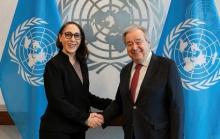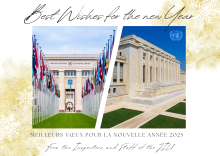News & Events

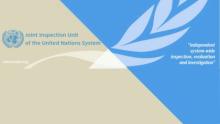


JIU Visits Uganda and Central African Republic for SEA Review
During the week of November 11th, Inspector Eileen Cronin visited Uganda and the Central African Republic as part of the JIU review on policies and practices to prevent and respond to sexual exploitation and abuse (SEA) in the United Nations system organizations. Inspector Cronin interviewed and conducted focus group discussions with 61 senior leaders and technical staff of JIU partnering organizations to understand the implementation of SEA-related policies. In addition, there was a short brainstorming workshop with 89 technical focal points from UN organizations and NGO counterparts.
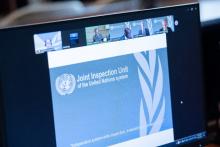
JIU Inspectors Participate in 220th Session of the UNESCO Executive Board
On October 10th, JIU Inspectors attended the meeting of the Special Committee during the 220th session of the UNESCO Executive Board to address questions regarding JIU reports relevant to UNESCO.
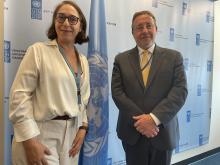
Highlights of JIU Mission to New York (03-05 September 2024)
JIU Chair, Carolina Fernandez Opazo and Executive Secretary Uren Pillay traveled to United Nations Headquarters in New York for a series of meetings including with JIU Focal Points, the Tripartite (with OIOS and the Board of Auditors), the UNDP Administrator and a presentation to the Joint Swiss-UNITAR Briefing on the UN Budgetary Matters.
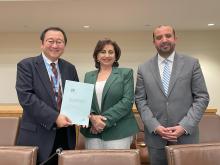
JIU Presentation of Management and Administration in UN-Women at the 2nd Regular Session 2024 of the Executive Board
The Joint Inspection Unit (JIU) presented the comprehensive review of Management and Administration in the United Nations Entity for Gender Equality and the Empowerment of Women at the 2nd Regular Session 2024 of the UN-Women Executive Board. Inspectors Toshiya Hoshino and Mohanad Al-Musawi delivered the findings to the Executive Board at UNHQ in New York on September 10th 2024.
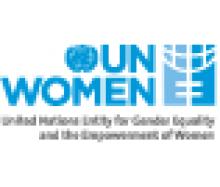
Review of management and administration in the United Nations Entity for Gender Equality and the Empowerment of Women (UN-Women) – JIU/REP/2024/1
The Joint Inspection Unit is pleased to announce the release of its report on management and administration in the United Nations Entity for Gender Equality and the Empowerment of Women (UN-Women), prepared by Inspectors Toshiya Hoshino and Mohanad Al-Musawi.
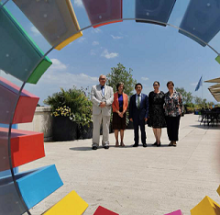
The JIU is pleased to announce that the findings and conclusions of the review of Management and administration in the FAO were presented by Inspector Carolina Maria Fernández Opazo at the FAO Finance Committee on May 23rd 2024.
The Joint Inspection Unit (JIU) is pleased to announce that the findings and conclusions of the review of Management and administration in the Food and Agriculture Organization of the United Nations (FAO) were presented by Inspector Carolina Maria Fernández Opazo at the FAO Finance Committee on May 23rd 2024. The relevant interaction lasted 3 hours and was structured as follows:
i. Presentation by JIU of the FAO-MAR;
ii. Presentation by FAO of management response to JIU report;
iii. Questions and answers by Finance Committee members;
iv. Second round of questions and answers; and
v. Discussion and acceptance of text regarding JIU FAO-MAR and management response for inclusion in Finance Committee draft report.

JIU presents the management and administration review of FAO during FAO’s 199th Session of the Finance Committee and the 175th Session of the Council
The Joint Inspection Unit is pleased to announce that the findings and conclusions of the review of management and administration in the Food and Agriculture Organization of the United Nations (FAO) will be presented by Inspector Carolina Fernández Opazo at the FAO Finance Committee and the Council on May 23rd and June 13th, respectively. The presentations to the FAO’s governing bodies aim at fostering transparency, informed decision-making, efficient resource allocation, and accountability within the scope of FAO’s governance.

Review of the quality, effectiveness, efficiency and sustainability of health insurance schemes in the United Nations system organizations – JIU/REP/2023/9
The Joint Inspection Unit is pleased to announce the release of its report on health insurance schemes for active and retired staff in the United Nations system organizations, prepared by Inspector Jesús S. Miranda-Hita. This topic was last covered by the JIU in 2007.
Health insurance is an essential part of the compensation package provided to the international organizations. While it is part of the obligation of the organizations to establish a social security scheme for their staff, retirees and families, the review found that in all cases except one, governing bodies and legislative organs have played a very limited role in health insurance policymaking, which has resulted in the existence of 26 different health insurance schemes in the 28 JIU participating organizations with different coverage and benefits.

Flexible working arrangements in the United Nations system organizations - JIU/REP/2023/6
The Joint Inspection Unit is pleased to share the Review Highlights and Full Report for the Review of Flexible working arrangements in the United Nations system organizations prepared by Inspector Victor Moraru.
Prior to the global health emergency, only a fraction of United Nations personnel took advantage of flexible working arrangements (FWA). The COVID-19 pandemic experience and lessons learned accelerated the reassessment of FWA in the United Nations system. According to the information provided by the JIU participating organizations, the destigmatization of flexible working arrangements, the digital technology enabling teleworking and the cultural shift towards work flexibility have led to significant increased interest on the part of United Nations personnel in the use of FWA post-pandemic, as well as to higher levels of acceptance by managers and teams, in particular of teleworking modalities.

JIU/REP/2023/2 (ILO Training Center)
At ILO Training Center, Inspectors Roscher and Miranda-Hita present JIU findings and recommendations on the internal pre-tribunal-stage appeal mechanisms available to staff of the United Nations system organizations
Following the issuance of their report, Inspectors Roscher and Miranda-Hita were invited by the ILO training center (Turin) to discuss the findings and recommendations for managing employment disputes effectively in international organizations.

JIU issues report on the internal pre-tribunal-stage appeal mechanisms available to staff of the United Nations system organizations
The Joint Inspection Unit is pleased to announce the release of its report on the internal pre-tribunal stage appeal mechanisms available to staff of the United Nations system organizations prepared by Inspectors Gönke Roscher and Jesús S. Miranda Hita.

JIU issues first report on mental health and well-being within the UN system
The Joint Inspection Unit is pleased to announce the release of its report on mental health and well-being policies and practices within the United Nations system prepared by Inspectors Eileen A. Cronin and Keiko Kamioka. The review, the first to comprehensively cover the topic of mental health and well-being, is timely considering the adjustments that participating organizations implemented during the pandemic as well as the conclusion of the first phase of the implementation of the UN System Mental Health and Well-being strategy.
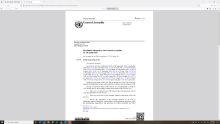
General Assembly resolution on JIU - A/RES/77/279
On the 18th of April 2023, the United Nations General Assembly adopted its annual Resolution concerning the work of the Joint Inspection Unit (A/RES/77/279). In the first part of the resolution, the UNGA reaffirms the mandate of the Unit as the only independent external oversight-body of the United Nations system and reiterates the importance of its evaluations and inspections for the identification of specific management, administrative and programmatic issues withing its participating organizations.

JIU concludes self-assessment exercise
In 2022, the Unit completed a comprehensive self-assessment exercise under the terms of reference and the benchmark framework developed for that purpose in 2021 and the first part of 2022. The aim of the self-assessment was to propose improvements to the Unit’s work in line with an assessment of the current situation from both a strategic and an operational perspective and to consider the evolution in that regard since the previous self-evaluation, which was held in 2013. This internal exercise covered several areas.

Review of measures and mechanisms for addressing racism and racial discrimination in the UN system organizations - JIU/NOTE/2022/1/Rev.1
The Joint Inspection Unit of the United Nations system (JIU) is pleased to share the Review Highlights and Full Report for the Review of measures and mechanisms for addressing racism and racial discrimination in United Nations system organizations: managing for achieving organizational effectiveness, prepared by Inspector Sukai Prom-Jackson.
What are the next steps to initiate to improve and to advance ongoing work to address racism and racial discrimination? What are the reflections and actions that need to be taken for transformative changes in addressing racism and racial discrimination, in view of global changes and challenges and the imperatives of a world characterized as volatile, uncertain, complex and ambiguous?


